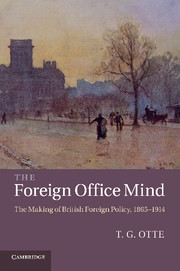Book contents
- Frontmatter
- Contents
- Illustrations (to be found between pages 146 and 147)
- Preface and acknowledgements
- List of abbreviations
- Introduction
- 1 Illusions of supremacy
- 2 The problems of isolation
- 3 Problems of consolidation
- 4 Two Eastern Questions
- 5 The transformation of Great Power politics
- 6 The end of an era
- Conclusion
- Select bibliography
- Index
- Plate section
- References
4 - Two Eastern Questions
the ‘Foreign Office mind’ and the period of flux in Great Power politics, 1892–1900
Published online by Cambridge University Press: 07 October 2011
- Frontmatter
- Contents
- Illustrations (to be found between pages 146 and 147)
- Preface and acknowledgements
- List of abbreviations
- Introduction
- 1 Illusions of supremacy
- 2 The problems of isolation
- 3 Problems of consolidation
- 4 Two Eastern Questions
- 5 The transformation of Great Power politics
- 6 The end of an era
- Conclusion
- Select bibliography
- Index
- Plate section
- References
Summary
The 1890s were marked by a greater fluidity in international politics. A concatenation of crises in the middle part of the decade inaugurated a process of change that would alter the constellation among the Great Powers, and Britain’s position within it. ‘[T]wo Eastern Questions’, the old-established one in the Eastern Mediterranean and a newly emerging one in the extremities of Asia, overshadowed the day-to-day concerns of the ‘Foreign Office mind’. They accelerated and reinforced the changes that were now afoot. The formation of the Franco-Russian alliance caught diplomats by surprise. This new international factor upset foreign policy calculations. It exacerbated existing strains with France, and turned Russia into a more formidable threat in Asia. Relations with post-Bismarckian Germany, meanwhile, became more volatile. The two countries alternately attracted and repelled each other. This also affected the existing ties with Germany’s Triple Alliance partners. The non-renewal of the Mediterranean accords underlined the growing distance to the German-led bloc as well as the further evolution of British interests.
‘Not so very rich in embryo ambassadors’: the fin de siècle diplomatic élite
Parallel to the altered ‘objective realities’ of Great Power politics, there were changes in the composition of the diplomatic services. These were caused, in part, by a natural demographic transition, and, in part, they occurred in response to external pressures. Combined, they altered the collective mind-set of Britain’s diplomats. Perhaps uniquely in the history of the nineteenth-century diplomatic service, all senior ambassadorial positions fell vacant between 1891 and 1896. The sudden deaths of White, Morier and Lord Vivian created vacancies at Constantinople, St. Petersburg and Rome. New ambassadors were needed at Vienna, Berlin and Paris following the retirements of Paget, Dufferin and Malet. At the Foreign Office, too, there was a shuffling of senior officials. Its permanent head, Sir Philip Currie, sought to relinquish his chores in Whitehall in exchange for the balmier climes of the Bosphorus. The retirement of one of the three AUSs, Sir T. Villiers Lister, and the death of another, Sir Percy Anderson, followed by the retirement of the head of the commercial department, Sir Charles Kennedy, made further changes necessary.
- Type
- Chapter
- Information
- The Foreign Office MindThe Making of British Foreign Policy, 1865–1914, pp. 186 - 239Publisher: Cambridge University PressPrint publication year: 2011



